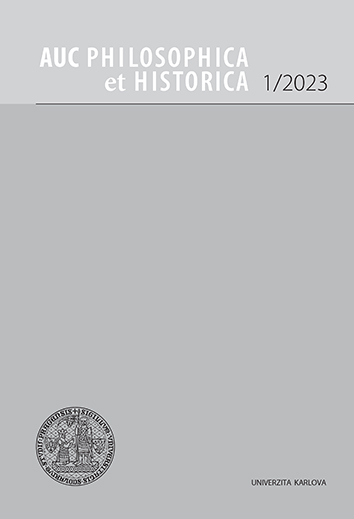AUC Philosophica et Historica (Acta Universitatis Carolinae Philosophica et Historica) is a multidisciplinary academic journal focused on the humanities with more than 50 years of tradition.
The journal is indexed in CEEOL, DOAJ, and EBSCO.
AUC PHILOSOPHICA ET HISTORICA, Vol 1992 No 2 (1992), 65–84
A. W. Gouldner – významný americký sociolog
[A. W. Gouldner – an Important American Sociologist]
Eduard Urbánek
DOI: https://doi.org/10.14712/24647055.2018.106
published online: 15. 01. 2018
abstract
The important American sociologist A. W. Gouldner lived from 1920 to 1980 In his early works he concerned himself with the problems of bureaucracy, organisation and functional autonomy. His relation to philosophy is documented by his early work on Plato. In the sixties his excellent essay on M. Weber and his concept of wertfreie Wisssenschaft made an impact In it he presented his criticism of a non-evaluative, uncommitted, technically and practically oriented sociology. He further worked out this problem in his study, published in 1968, where he treated the problem of a sociologist’s commitment, Gouldner sides with the oppressed, the underdogs. The task of the sociologist is not only to study the life of the oppressed and socially weak classes, the sociologist must study the rulers, those in power. An important stage of A. Gouldner’s scholarly activities is represented by the large study The Coming Crisis of Western Sociology, which caused a lot of both favourable and critical comment. This study is one of the highlights of his work. It analyses the crisis of western, especially American sociology as a part of a crisis of the society. It treats ideology, the commitment of sociology, and thoroughly criticizes American structural functionalism and its chief representative, T. Parsons. 1 here is presented an outline of the author’s conception of reflexive sociology. Then follows the study For Sociology where the author considers a concretisation of the concept of political partiality and commitment. He speaks for the commitment in labour and socialist movements. Yet he is afraid that political partiality may prove too binding for a scholar in case a political movement veers away from the principles it had wanted to establish. Therefore he wants to be committed in the way of the Frankfurt school, which he understands as a specific kind of a scientific community, loosely connected with Marxism and Practical movement. In the same study there appears also his concept of two Marxisms and two directions inside Marxism – the scientific and the critical one. The conclusion of Gouldner’s work is represented by the trilogy called The Dark Side of Dialectics. In it he states his commitment to Marxism, defines himself as an outlaw Marxist, a disinherited one, a Marxist Socratist. There are pronounced influences of J. Habermas’s concepts of communication, linguistic and hermenutic approaches. The trilogy is concerned with the questions of the relations of ideology and technology, the rise of a new class of cultural capital, and the third part analyses differences and anomalies in Marxism in line with the autor’s concept of two Marxism. His relation to Marxism is critical, with elements of sympathy. He condemns the politics of the deformation of Marxism in the years of Stalinism and Neostalinism, the years of stagnation in the U.S.S.R. A. Gouldner is undoubtedly one of the important American sociologists. He influenced the development of sociology even outside the U.S.A. His works won acclaim also in Europe – which is documented by the translations of many of his works. His works represented an, in the context of American and world sociology desirable, differentiated and in his professional development deepening methodological pluralism which is necessary for the differentiation and diversity of approaches, concepts and solutions of important and critical problems of sociology.
